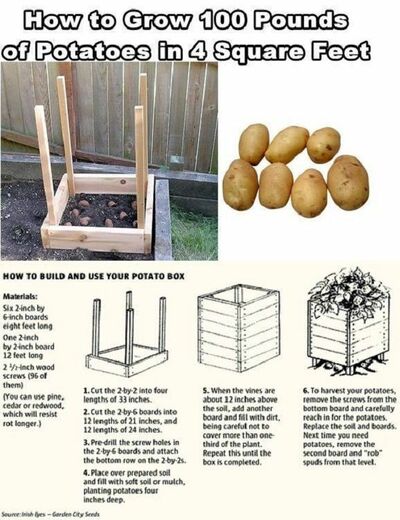Potatoes
- Organic Potato Growing Guide - good guide from Wood Prairie Farm, a good source of organic seed potatoes.
- How to Grow Organic Potatoes: No. 1 Potato Expert Shares His Best Tips Locall saved pdf - Another very good article from Wood Prairie Farm. Covers other topics than article above.
-

 Growing Potatoes - IrishEyesGardenSeeds.com - Really great, in-depth guidelines. Source
Growing Potatoes - IrishEyesGardenSeeds.com - Really great, in-depth guidelines. Source
- Organic Seed Potato Planting Guide
- 15 Potato Growing Tips To Significantly Increase Your Harvest - Some take-aways:
- Growing early potatoes in greenhouse, tunnel or 5-gal buckets.
- Adding seaweed, leaf mulch and comfrey leaves in buttom of trenches when planting.
- Mound up a little but also add mulch.
-
 Why Do Potatoes Sprout and How Can You Prevent Sprouting? - most complete curing guidelines I've seen. source
Why Do Potatoes Sprout and How Can You Prevent Sprouting? - most complete curing guidelines I've seen. source
- Compost 25-50 pounds per 100 square feet should be sufficient
- If compost is "weak", can supplement with PH. Not too much nitrogen (too leafy) or K (causes less protein).
- pH 5.2-6.8
- Planting distance: typically 12-15 inches between plants and 2-3 feet between rows. I've been planting them closer to 10" apart.
- Soil prep: Fertile soil that has good aeration, plenty of organic matter and a granular structure is ideal, such as sandy loam that drains well. Heavy clay soil that holds moisture around a developing tuber will impact that tuber negatively (in such cases, growers can lighten soil with coir or leaves). Potatoes are a heavy-feeding crop, so make sure your soilÃÂs fertility level is high, with good, balanced mineralization. After you have a high level of fertility, you can cut back on amendments. To get to that point, we add 10 to 20 tons of compost per acre, which equates to almost a pound per square foot, and then we scale down.
- Wait until the soil is 50 degrees so that the seed pieces will heal and grow quickly. We measure soil temperature at a 3-inch depth at 7 or 8 a.m., before the sun warms the soil.
- For ease of harvest: The single best method is to plant your potatoes quite shallowly and mulch them. Then, you can peel back the mulch and the potatoes will be within the top few inches of soil. A high-quality spading fork is the ideal tool for harvesting. Use your foot to push the fork in at the edge of the row, where it wonÃÂt spear any tubers, and then lean back until it frees up the soil and the tubers all in one motion.
- Fertilization - "Potatoes do best in soil with a pH ranging from 5.2-6.8. Alkaline soil will tend to make many varieties get scabby. Potatoes also respond to calcium, but newly-applied agricultural lime can induce scab so if lime is needed, far better if it was added the previous year. On soils already above 6.0 we recommend using a little gypsum to supply calcium while leaving the pH just about unchanged. Gypsum applied at 1 ton/acre (that's 5 pounds per 100 square feet) provides all needed calcium. As far as NPK goes, potatoes need well-balanced nutrition. Properly made compost at 5-10 tons per acre (25-50 pounds per 100 square feet) mainly dug into the rows below the seed is generally sufficient to produce a fine crop, while also supplying all the organic matter most soils need. If the compost is not "strong," we recommend supplementing it with fertilizer, but not too much. Potatoes given too much nitrogen grow lots of leafy vines but make few tubers. Too much potassium and your tubers may contain less protein. Organic gardeners may use any kind of seedmeal cottonseed, soy, linseed, canola, etc.), dug in with compost at a rate of about 1-2 gallons per 100 row feet. Alfalfa meal or chicken manure compost also works fine used at twice that rate." - IrishEyes
- Watering - "In most parts of the United States, potatoes can be grown without irrigation if the soil is deep and open...[T]here are some definite nutritional and quality advantages to accepting the significantly lowered yield that happens when potatoes don't receive all the water they could use. Simply stated, un-irrigated potatoes are less watery and taste better." - IrishEyes
potatoe breeding
Sweet Potatoes
- The Easiest Way To Grow 11 kilos (25 Pounds) Of Organic Sweet Potatoes At Home
- How to Cure Sweet Potatoes - "Curing sweet potatoes requires a warm, humid environment for a period of 4 days to two weeks. Ideally, 80-85 degrees with 80-90 percent humidity. The closer you come to these ideal conditions, the less time it takes to do the job. After curing, you are supposed to store them at 55-60 degrees for six to eight weeks to finish developing the sugars. We donÃÂt do this, and it doesnÃÂt seem to matter."
 Copyright © by the contributing authors. All material on this collaboration platform is the property of the contributing authors.
Copyright © by the contributing authors. All material on this collaboration platform is the property of the contributing authors. Ideas, requests, problems regarding Middle Fork Home Wiki? Send feedback
Syndicate this site
RSS
